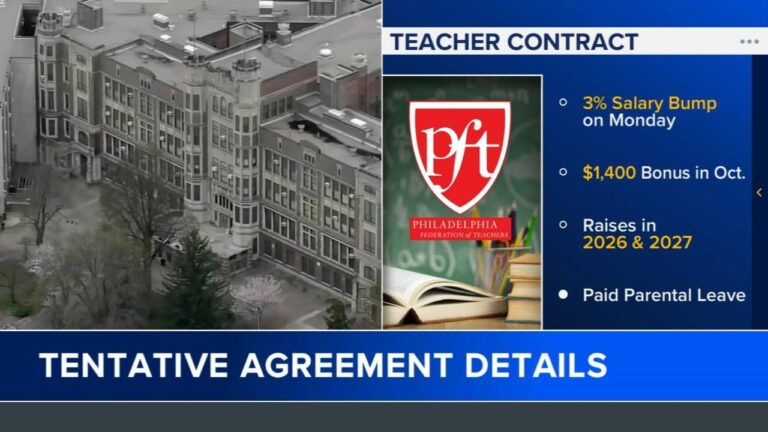Philadelphia’s Teachers’ Contract: A Turning Point Amidst School Closures and Community Outcry
Controversy Surrounding Philadelphia’s New Teachers’ Agreement
The latest contract ratified between Philadelphia’s teachers union and the school district has ignited intense debate among educators, families, and local advocates. Many critics argue that the agreement, which includes significant compromises, jeopardizes both teacher welfare and student success. Central to the controversy are provisions such as salary freezes and weakened safeguards against layoffs, which many see as facilitating deeper budget cuts and accelerating the closure of public schools, particularly in underserved neighborhoods. This has raised alarms about widening educational disparities and the erosion of community trust.
Primary concerns highlighted by opponents include:
- Increased job insecurity due to reduced protections for staff retention
- Suspension of incremental pay raises despite inflation and rising living expenses
- Greater administrative power to close schools without meaningful community consultation
- Limitations placed on teachers’ roles in key decision-making processes
| Contract Aspect | Initial Union Proposal | Finalized Terms |
|---|---|---|
| Annual Salary Increase | 3% raise each year | No increase for two years |
| Layoff Recall Rights | Recall based on seniority | Recall based on performance evaluations |
| Community Role in School Closures | Mandatory community voting | Approval solely by School Transformation Manager |
Union Leadership Under Fire: Accusations of Complicity in Public School Decline
Union officials in Philadelphia have faced mounting criticism from teachers, parents, and grassroots organizers who accuse them of surrendering to the school district’s austerity demands. Rather than staunchly defending educators’ rights and advocating for adequate funding, union leaders are perceived to have brokered a deal that tacitly endorses severe budget cuts and the shuttering of numerous schools. This backlash has fueled calls for a fundamental overhaul of union governance to ensure that frontline educators’ voices are prioritized over administrative compromise.
- Concessions made: Key union demands on staffing and resource protections were abandoned.
- Community response: Parent coalitions and student groups have organized protests demanding greater transparency.
- Leadership scrutiny: Rank-and-file union members are demanding leadership accountable to educators’ interests.
| Issue | Union Stance | Community Reaction |
|---|---|---|
| School Closures | Allows phased shutdowns | Strong opposition; protests planned |
| Budget Reductions | Accepted lower funding levels | Calls for alternative revenue streams |
| Teacher Employment Security | No firm guarantees against layoffs | Demand for stronger protections and rehiring rights |
Impending School Closures: Displacement of Thousands of Students and Educators
The contract’s ratification has intensified fears about the imminent closure of numerous Philadelphia public schools, threatening to uproot thousands of students and staff. Educators and community leaders warn that these closures will disproportionately impact low-income neighborhoods, disrupting students’ education and fracturing vital community networks. The district’s closure plan, announced shortly after the agreement, targets several schools for shutdown within the next academic year, sparking urgent calls for resistance and greater transparency.
Key issues raised include:
- Overcrowding: Remaining schools face increased student populations, straining resources.
- Job insecurity: Dozens of teachers and support personnel face layoffs or forced transfers.
- Loss of specialized programs: Unique educational offerings at closing schools risk being eliminated.
| School | Current Enrollment | Scheduled Closure | Staff Impacted |
|---|---|---|---|
| Northview Middle School | 480 | August 2024 | 38 |
| Harbor Elementary | 530 | July 2024 | 42 |
| Franklin High | 920 | September 2024 | 55 |
Mobilizing Communities and Demanding Transparency to Safeguard Local Schools
The backlash against Philadelphia’s teachers’ contract has galvanized a broad coalition of parents, educators, and community activists determined to defend neighborhood schools. There is a growing movement calling for grassroots organizing to pressure both the school district and union leadership to reconsider the terms and halt the wave of closures. Advocates emphasize that local schools are essential community pillars and must be preserved as public assets.
Transparency in contract negotiations remains a critical demand. Stakeholders insist on open bargaining sessions and public access to all agreements to prevent secretive deals that could harm public interests. Key community demands include:
- Hosting public forums to gather community feedback before contract ratification
- Establishing clear, education-focused criteria for any proposed school closures rather than purely budget-driven decisions
- Full disclosure of budget allocations affecting staffing and school resources
- Appointment of independent monitors to oversee negotiation processes and ensure accountability
| Group | Primary Demand | Current Status |
|---|---|---|
| Teachers Union | Stronger job security provisions | Compromised in latest contract |
| Parents and Community Advocates | Prevention of mass school closures | Insufficiently addressed |
| School District Officials | Budget restructuring and cost savings | Prioritized over community concerns |
Looking Ahead: The Future of Philadelphia’s Public Education at a Crossroads
As Philadelphia’s educators finalize a contract that many perceive as a concession undermining broader educational and labor priorities, the consequences are poised to ripple throughout the city’s public school system. Critics warn that this agreement may hasten the closure of numerous schools, disproportionately affecting working-class neighborhoods and threatening the long-term viability of public education in Philadelphia. The coming months will be pivotal as teachers, parents, and community activists mobilize to challenge these developments and advocate for a more equitable and transparent approach to education policy.








